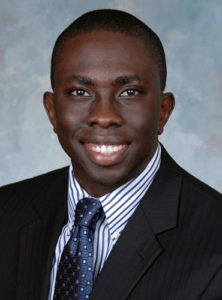
For Stephen Abanise, protecting the constitutional rights of individuals is at the heart of his work as a Senior Trial Attorney at the Internal Revenue Service (IRS), Office of Chief Counsel. As a professor in the MS in Criminal Justice program at USC Bovard College, he hopes his students learn how to improve, analyze, and evaluate the varying criminal justice systems in the United States and bring that knowledge into their work across the system.
In his role as a Senior Trial Attorney, Professor Abanise litigates federal court cases enforcing tax laws in collaboration with the US Department of Justice. Prior to becoming a trial attorney, he served as an Estate and Gift Tax Attorney within the IRS and completed law clerkships with the Los Angeles County District Attorney’s Office. Professor Abanise earned a JD from Indiana University’s Robert H. McKinney School of Law, a Master of Health Administration (MHA) from The George Washington University, and a Master of Social Work (MSW) from the University of Southern California. He is admitted to the State Bar of California. When Professor Abanise isn’t in court, he is spending time with his family, friends, and his local church.
Below, Professor Abanise expands on his experience as an attorney, the benefits of teaching criminal justice students at USC Bovard College, and the importance of research and analysis in the criminal justice field.
How does your job as a Senior Trial Attorney for the IRS inform how you teach?
As a Senior Trial Attorney at the IRS, Office of Chief Counsel in Laguna Niguel, California, I litigate federal court cases involving fraud, disputed tax deficiencies, and collection and refund matters in collaboration with the Department of Justice. These experiences concentrate on enforcing tax laws and provide significant insight into the practical legal and academic experiences that can be utilized in teaching criminal justice students as a professor.
What does a typical day look like for you in this role?
I spend a significant majority of my time and day litigating cases in court and communicating with private attorneys, as well as the court and Judge’s chambers on behalf of the federal government. In litigation, I also collaborate and advise the Department of Justice Attorneys and Assistant United States Attorneys on federal court cases.
What are some challenges in this role?
While being a trial attorney and engaging in litigation is already immensely challenging, there are great experiences gained from the vast legal framework of the United States justice system. I deal with complex litigation that includes fraud, ethical decision-making, whistleblower information, and attorney-client privileges. In resolving such cases, I collaborate with multiple stakeholders throughout the day, including federal Internal Revenue agents, IRS Appeals Officers, Assistant U.S. Attorneys, the court, and local community organizations. Furthermore, these cooperative collaborations assist in efficiently resolving legal court cases with a result that upholds justice for all parties and stakeholders.
Can you tell us about a career highlight that you’re proud of?
During my time as a federal government Attorney, I have tried and won 4 court trials that have resulted in favorable court opinions for the government from the United States Tax Court. I have also advised and collaborated with Department of Justice Attorneys and Assistant United States Attorneys in resolving their litigated cases.
What do you hope students take away from the classes you teach, like CJ 545: Criminal Investigations?
When I teach criminal justice classes such as CJ 545, I aim to develop student’s academic and legal reasoning in developing criminal justice interventions that help to improve, analyze, and evaluate the varying criminal justice systems in the United States. I also aim to develop students’ overall focus and attention on ascertaining facts in relation to laws, statutes, and ultimately in terms of ascertaining the policy usefulness of research and criminal justice initiatives.
What changes would you like to see in the criminal justice system?
As we continue to develop our criminal justice system, criminal justice scholars must continue to expand research on innovative processes that include technological advances. These advances can improve the communication of actions taken by law enforcement and criminal justice professionals. An increased use of legal technological advances and applications can assist law enforcement and community members alike in accessing information. This is relevant in reducing misinformation regarding current critical events and/or legal cases within the criminal justice system. In addition, increased use of newer technologies and/or advances can also assist in matters such as Freedom of Information Act (FOIA) requests for government information, and even information relevant to body-worn cameras being sought by community members.
Do you have any guiding principles that inform how you approach your work?
In teaching criminal justice classes, I focus on the heightened need to protect the constitutional law rights of individuals in all aspects in which the public engages with the criminal justice system. These include rights that are protected under the 4th, 5th, 6th, 8th, and 14th Amendments of the United States Constitution.
What excites you about teaching students at USC Bovard College?
One of the many things that excites me about teaching criminal justice students is the overall academic and professional experiences that students bring to class each week. More specifically, as a professor, I engage students who are prepared from day 1 to engage with the criminal justice material and develop their own academic knowledge, based on their experiences within didactic lectures and class breakout sessions.
Learn more about the MS in Criminal Justice program.


